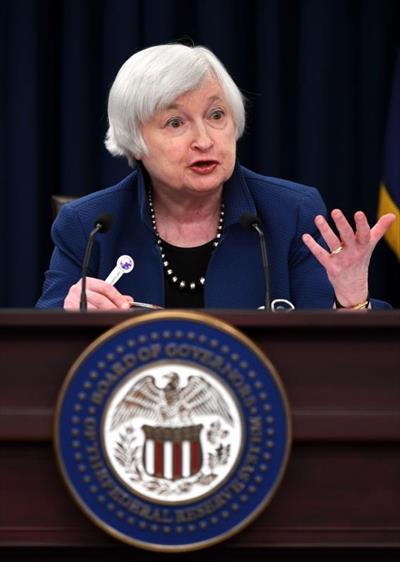How will the US interest rate hike play out?
- By Xu Hongcai
 0 Comment(s)
0 Comment(s) Print
Print E-mail Beijing Review, March 28, 2017
E-mail Beijing Review, March 28, 2017
|
|
|
U.S. Federal Reserve Chair Janet Yellen speaks during a news conference after a two day Federal Open Market Committee meeting in Washington, March 15 [Xinhua] |
The U.S. Federal Reserve raised the target overnight interest rate by 25 basis points to a range of 0.75 to 1 percent on March 15. The widely expected move marks the third rate rise in almost a decade and the first one since Donald Trump took office.
The rate increase implies an optimistic outlook for the U.S. economy. Although how many more rate hikes will come this year remains unknown, one thing is for sure—the Fed will accelerate the pace of rate hikes, compared with the once-a-year frequency in 2015 and 2016.
The decision was made on the basis of major U.S. economic indicators. The consumer price index (CPI), a main gauge of inflation, registered above 2 percent in the past two months, and the core CPI exceeded 2 percent, approaching its long-term target of 2 percent. In the labor market, non-farm payrolls increased by 230,000 in the last two months, while the unemployment rate dipped. More importantly, consumer confidence and corporate investment are on the rise. The rate hike is anticipatory in nature, as the market is expecting Trump's new policies to lift the U.S. economy.
In general, the rate hike will have a mild impact on the U.S. economy, from the capital market to the financial system. On the one hand, market confidence will be boosted as the U.S. economy appears to have a promising outlook, and stock indices may rise. On the other hand, the rate hike's influence on the U.S. dollar had played out in the foreign exchange market before the increase actually occurred. The U.S. dollar dropped when the Fed announced the decision, which shows the limited effect of the rate increase.
There's no need to worry too much about the depreciation pressure on the Chinese currency, the yuan. The rate rise will not necessarily cause worldwide capital to flow to the U.S., nor will it result in greater devaluation pressure on the yuan. In the short run, as long as the yuan exchange rate maintains basically stable at an adaptive and balanced level against a basket of major foreign currencies, stability of the yuan will be guaranteed.
A rise in inflation has naturally brought about a rate hike, reflecting the return of U.S. monetary policy to a more normal footing. In the past, the Fed adopted an overly loose monetary policy to deal with the financial crisis. But a low or even negative interest rate can bring about huge risk.
The current federal funds rate now stands at 0.75 to 1 percent, close to a neutral level, which indicates steady economic growth and proper capital supply. With inflation at 2 percent, if the economy grows at 2 percent, a federal funds rate of around 1 percent will be at a neutral level.
Undoubtedly, it is currently unnecessary to raise rates too frequently to cool down an overheating economy. Interest rate cuts to stoke rapid economic growth are not necessary either. Therefore, a much faster pace of rate rises is not to be expected in the United States. It remains to be seen when the Fed will raise the rate again this year. If it does, it is very likely to happen in the third quarter.
There is no smooth road ahead in terms of the U.S. economic recovery. Uncertainties abound about the implementation of future policies. It is still unknown whether Trump's new policies, such as tax cuts, investment expansion, increased government spending and revenue reduction, as well as his budget plan, will be approved by the House and the Senate. Besides, whether the financing can be used for a series of issues such as infrastructure construction remains to be seen. In the face of this, one needs to stay calm about the future. After all, the U.S. entering into the rate hike cycle is already a good signal for the global economy. This will promote sound and steady U.S. economic growth and better export prospects for China.
The negative impact of the U.S. rate rise should not be exaggerated. The yuan will not encounter drastic depreciation, nor will emerging economies suffer shock. It's unlikely that financial risks will spread further. The global economy is going through a modest recovery, but one which is lacking in momentum. In the long run, it is on an upward trend.
The author is deputy chief economist of the China Center for International Economic Exchanges







Go to Forum >>0 Comment(s)